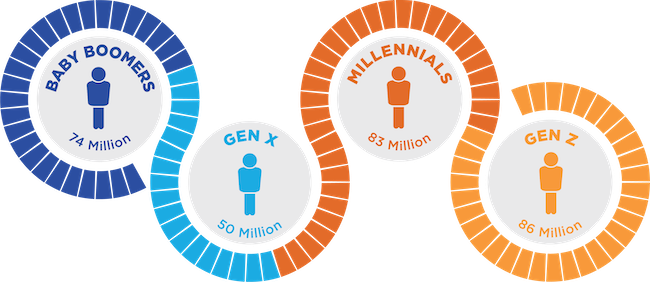
There’s a TV commercial from a couple of years ago which shows a baby boomer portraying a standup comedian who gets up in front of an equally mature audience and complains, “Millennials, amirite!”
I laughed when I first saw the spot, and as a card-carrying member of Generation X, I thought that simple line captured the quandary of one generation trying to both understand and collaborate with a younger demographic. What starts out as a complaint hopefully evolves into a greater effort to understand the generation of Americans born between 1981 and 1996.
Recently, the Springfield Chamber, in its popular LunchVox LIVE series, provided an in-depth conversation about how companies are working to better integrate “next-gen” professionals into the workforce and help them drive change within their organizations. Such an effort is more important than ever since millennials are now the largest generational cohort in the workforce, and Generation Z is right behind them.
Now, I know that some readers might roll their eyes and think, “Not another think piece about millennials, for goodness sakes.” And indeed, this generation may be the most analyzed and studied group of people in history. But the reasoning behind such scrutiny stands on very solid footing. This generation is not only enormous in size, but enormous in the impact they have on today’s economy and that of tomorrow.
The moderator for the panel discussion, Henry Fields, Workforce Analyst for the Oregon Employment Department, kicked off the day by talking about the two profound events that shape the worldview of millennials: the Great Recession of 2008 and COVID.
“This is their shared economic history,” he said. “Millennials grew up in the shadow of a multi-year, global economic shock. You can’t come of age during these events and not have it affect how you see the world and your place in it.”
Notable differences
He also noted some key facts about how this generation differs from previous ones and how those differences impact their work and leadership philosophies.
“They have higher levels of diversity and higher levels of college degrees, yet fewer of them own homes and earn a living wage than previous generations,” he went on to say.
The three panelists representing a wide variety of industries and management perspectives took turns providing their own key learnings and strategies for both attracting and retaining younger generations. Based on questions from the virtual audience, this discussion took on even more significance given the tight labor market and the difficulties all sectors of the economy are having to fully staff up their operations.
First up was Karen Lyons, marketing director at Oakmont Family Dental. Two of Lyons’ key takeaways can best be summarized as “leveling up” and “transparency.”
“In our experience, many younger workers really crave knowing what they need to do to reach the next level of their career,” she said. “As such, we have invested a lot in both formal and informal training and education so they can see a path forward toward achieving their next level of responsibility.”
Lyons explained that Oakmont strongly believes in mentoring, especially pairing younger employees with seasoned veterans, to not only learn the ropes and culture but also to share potential paths for moving up in the organization.
Words, and actions
Secondly, Lyons talked about how vital it is for a company to be truly open and honest with all employees, and that those in younger generations are even more expectant of such transparency.
“Many younger employees want to work for a transparent company and want to see that philosophy in practice among every level of leadership,” she said. “For example, we have two practices that we utilize with all employees. The first is that we survey our employees and ask them for three things we do well AND three things where we are falling short. Next, we have a process where employees have reviews with their supervisors and top company management. After the initial meeting, however, only the employee and top management remain to discuss if the supervisor is living up to the company culture.”
The next speaker was Ryan Williams, human resource specialist at 9Wood. 9Wood produces custom wood ceilings for businesses and universities, and Williams picked up the mantle of culture and its importance to next-gen professionals.
“A while back, we instituted a dress code at our office,” said Williams. “It was the wrong thing to do. It didn’t fit our culture and it only lasted 10 days. I believe that today you must constantly evaluate your culture and adjust so your workforce can buy into what you are doing.”
One of the ways 9Wood evaluates its company culture relies on a principle from the Toyota Method of training. This decades-old management philosophy puts the onus for successful employee learning back on the trainer.
“The principle states that if the employee hasn’t learned, the trainer hasn’t trained,” he said.
Williams explained that such a practice is part of the philosophy of servant leadership where a manager’s chief purpose is to serve their people, not the other way around.
Servant leadership
A foundational element of servant leadership is for supervisors and employees to stand on equal footing. Wood helps to underscore this relationship with their weekly 30-minute water cooler meetings where employees and supervisors are allowed to talk about anything other than work. The idea is to create personal bonds among employees at all levels of the organization.
The final presenter was Mark Harrington, journeyman carpenter, recruiter, and trainer at Chambers Construction. The oldest among the panelists, Harrington provided sound advice for integrating younger employees.
“We have a program called ‘boss for a day’ where we have a junior member of a work team make all of the decisions for a specific job,” he said. “Providing younger employees with both a sense of ownership and also an opportunity to earn trust among their peers is huge in our company.”
Harrington also noted that creating a solid culture is a very down-to-earth and bottom-lined focused principle.
“Look, if you keep employees motivated, provide opportunities for advancement, and make your business a good place to work, they will stay with you, and you don’t need to constantly replace them,” Harrington said.
At the end of the presentations and the Q&A, it became clear that, while there are important distinctions among generations of workers, people are people. We all want to work at a place that treats us with respect, provides opportunity, and develops a culture that is honest and empowering.
Perhaps one substantive difference between a Generation Xer like me and millennials is that it took me more than a few years to expect that kind of treatment. Today’s newer employees expect it on day one.
Email:







